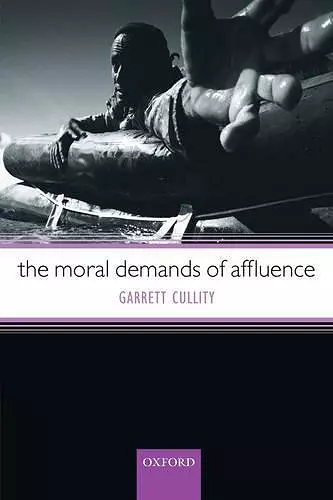The Moral Demands of Affluence
Format:Paperback
Publisher:Oxford University Press
Published:21st Sep '06
Currently unavailable, and unfortunately no date known when it will be back
This paperback is available in another edition too:
- Hardback£115.00(9780199258116)

How much are we morally required to do to help people who are much worse off than us? On any credible moral outlook, other people's pressing need for assistance can ground moral requirements on us to help them---requirements of beneficence. How far do those requirements extend? One way to think about this is by means of a simple analogy: an analogy between joining in efforts to help people at a distance and rescuing a needy person yourself, directly. Part I of Garrett Cullity's book examines this analogy. In some ways, the analogy is not only simple, but politically and metaphysically simplistic. However, it contains an important truth: we are morally required to help other people, indirectly as well as directly. But the number of needy people in the world is enormous, and their need is very great. Once we start to recognize requirements to help them, when is it morally acceptable to stop? Cullity answers this question in Part II. Examining the nature of beneficence, he argues that its requirements only make sense on the assumption that many of the interests we share in common-rich and poor alike-are interests it is not wrong to pursue.
Review from previous edition How much money and time does morality oblige the relatively affluent to devote to the relief of poverty, suffering, and other disadvantages? Anyone who finds this question remotely important should read Garrett Cullity's meticulous, even-handed treatment. The publication of this monograph signals the continuing emergence of a normative orientation that one might call "beneficence theory". . . . Many philosophers are attracted to the arguments which Cullity . . . dismantles. They will learn from him. By treating well-chosen opposing views so carefully and thoroughly, the book also rewards those who reject the author's ultimate conclusions. . . . the book offers something for nearly everyone. . . . the chapters are well-organized and clearly written. An advanced undergraduate with an ethics background should be able to follow them, and will gain a sophisticated overview of this vital area. * Notre Dame Philosophical Reviews *
Cullity has presented us with a thorough, detailed, and serious argument ... an important contribution to the discussion of this issue. * James R. Otteson, Journal of Value Inquiry *
- Winner of Winner of the Australian Catholic University Eureka Prize for Ethics 2008.
ISBN: 9780199204151
Dimensions: 234mm x 155mm x 18mm
Weight: 472g
300 pages